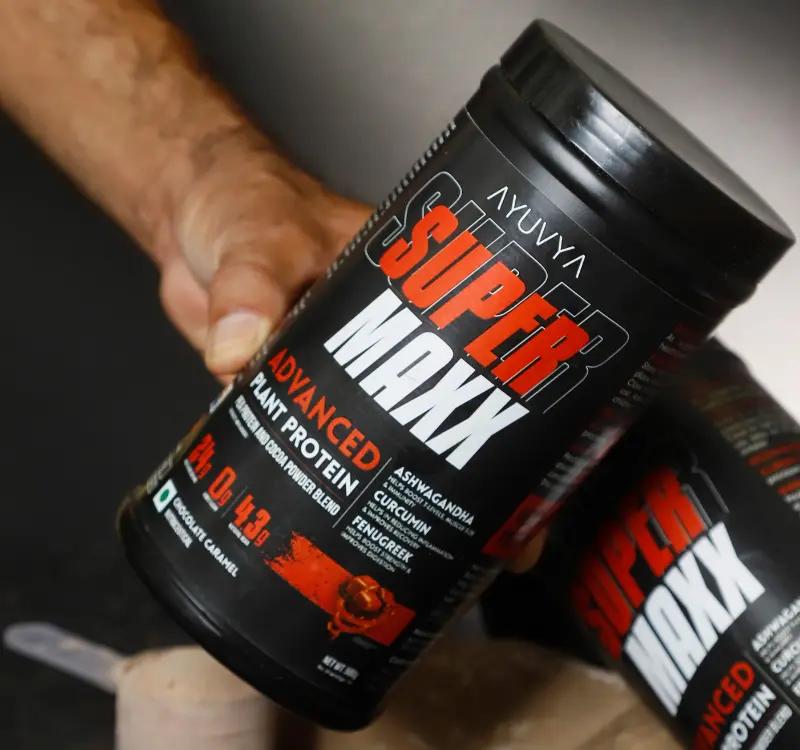Everything About Plant-Based Protein Powder
Jul 17, 2024

In the last few years, animal-based proteins such as whey protein, and casein protein, have been forced to take a back seat as plant based protein powders seem to have gained some popularity.
Table of Contents:
- Let’s first understand what protein actually is?
- Dosage of Protein
- Plant-based protein powder
- Is it safe to consume plant-based protein powder?
- Way forward
- Conclusion
- FAQs
In this blog, we try to understand the benefits and relevance of the plant protein powders that help in building lean muscle mass as well as overall health.
Let’s first understand what protein actually is?
Protein, a macronutrient essential for numerous bodily functions such as supporting muscle growth, repairing tissues, providing satiety, and more, is composed of amino acids. These amino acids serve as the building blocks for the body. Think of protein as akin to construction workers and materials that form your entire body—muscles, vital organs, skin, hair, and nails.
Protein plays a fundamental role in the structure, function, and regulation of nearly every tissue and organ in the human body. Firstly, proteins are crucial for tissue repair and growth. Amino acids derived from dietary proteins are used to build and repair tissues, including muscles, skin, hair, nails, and internal organs. This is particularly important for individuals involved in physical activities or those recovering from injuries.
Secondly, proteins serve as enzymes that facilitate biochemical reactions in the body. Enzymes are catalysts that speed up chemical reactions, such as those involved in digestion, metabolism, and cellular energy production (ATP synthesis).
Furthermore, proteins are integral components of hormones and neurotransmitters. Hormones such as insulin, which regulates blood sugar levels, and neurotransmitters like serotonin, which regulates mood, are made from proteins. These molecules play critical roles in maintaining homeostasis and regulating bodily functions.
Proteins also contribute to immune function by producing antibodies that recognize and neutralise foreign invaders like bacteria and viruses. Additionally, proteins transport substances such as oxygen (in the form of haemoglobin) and lipids (in the form of lipoproteins) throughout the body.
Lastly, proteins provide a source of energy when carbohydrates and fats are insufficient. Although the primary role of proteins is not energy production, they can be broken down into amino acids and converted into glucose or used for energy when needed.
Protein is essential for growth, repair, enzyme function, hormone production, immune response, and energy provision in the human body. Adequate intake of dietary protein is crucial for maintaining overall health and supporting optimal bodily functions.
Dosage of Protein
Ensuring an adequate protein intake is essential for overall health, especially for those who are physically active or looking to maintain muscle mass and weight management. Following is the generally accepted dosage recommended -
For sedentary adults (RDA): 0.8 grams to 1 gram per kilogram of body weight.
Plant Protein can be enjoyed by every person whether they are gym goers or any individual with little activity or any sedentary person.
Plant-based protein powder
Plant-based protein powder is a dietary supplement derived solely from plant sources, containing no animal-based ingredients. It is designed for vegan and vegetarian diets, as well as for individuals with lactose intolerance. Plant-based protein powders do not contain any animal-derived ingredients such as milk or eggs; instead, they are sourced from plants like peas, soybeans, and hemp. These powders typically provide all essential amino acids necessary for muscle repair, healthy ageing, weight management, and overall health.
So why is plant-based protein powder the right choice for you?
Plant-based proteins contribute to a well-rounded diet rich in diverse nutrients that support various bodily functions and may reduce the risk of chronic diseases.
Choosing plant-based protein powder above animal-based protein may contribute to many health benefits such as:
1. Complete Amino Acid Profile: Many plant protein powders, such as pea protein and soy protein, provide a complete array of essential amino acids necessary for muscle building and repair.
2. Digestibility: Plant proteins are often easier to digest than animal proteins, making them suitable for individuals with digestive sensitivities or allergies.
3. Nutrient-Dense: Plant protein powders can be rich in vitamins, minerals, antioxidants, and phytonutrients, contributing to overall health and well-being.
4. Lower in Saturated Fat and Cholesterol: Unlike animal protein sources, plant proteins are typically lower in saturated fat and cholesterol, which can support heart health and reduce the risk of chronic diseases.
5. Supports Vegan and Vegetarian Diets: Plant protein powders provide a convenient and effective way for vegans and vegetarians to meet their daily protein needs without consuming animal products.
6. Environmental Sustainability: Producing plant-based proteins generally has a lower environmental impact compared to animal-based proteins, making them a more sustainable choice.
7. Versatility: Plant protein powders can be easily incorporated into a variety of recipes, including smoothies, baked goods, soups, and sauces, enhancing the nutritional value of meals.
8. Weight Management: Plant proteins can help promote feelings of fullness and satiety, which may aid in weight management and control of food cravings.
Is it safe to consume plant-based protein powder?
It is safe to have plant protein powder as a part of a balanced diet. Plant protein powders are typically made from sources like peas, soybeans, hemp, or brown rice. They provide a convenient way to supplement protein intake, especially for those who have dietary restrictions or preferences. These are typically well-tolerated by many individuals.
As with many supplements, it’s important to choose a reputable brand and use it as directed to ensure safety and effectiveness.
Way forward
In recent years, plant-based protein powders have surged in popularity, overshadowing traditional animal-based options like whey and casein. This shift reflects growing awareness of the benefits and relevance of plant proteins in promoting lean muscle mass and overall health.
Proteins, essential macronutrients, are composed of amino acids that serve as the body's building blocks, vital for muscle growth, tissue repair, and maintaining satiety. They play diverse roles as enzymes facilitating biochemical reactions, hormones regulating bodily functions, and antibodies bolstering immune defences. Proteins also transport substances like oxygen and lipids, while serving as a backup energy source when carbohydrates and fats are inadequate.
Plant protein powders, derived solely from sources like peas, soybeans, and hemp, offer several advantages over animal-based counterparts. They provide a complete amino acid profile necessary for muscle repair and health maintenance. Additionally, plant proteins are generally easier to digest, making them suitable for individuals with dietary sensitivities. They are nutrient-dense, packed with vitamins, minerals, antioxidants, and phytonutrients that support overall well-being and may reduce the risk of chronic diseases. Compared to animal proteins, plant-based options are lower in saturated fats and cholesterol, benefiting heart health.
These powders cater to vegan, vegetarian, and lactose-intolerant diets, offering a sustainable protein source with a lower environmental footprint. Their versatility allows for easy integration into various recipes, enhancing nutritional content and aiding in weight management by promoting satiety.
Conclusion
In conclusion, plant-based protein powders provide a safe and effective dietary supplement option. Choosing reputable brands and following recommended usage guidelines ensures their safety and maximises their health benefits within a balanced diet. Whether for athletes, active individuals, or those seeking dietary diversity, plant proteins offer a compelling alternative to meet daily protein needs while supporting overall health and sustainability.
Frequently Asked Questions
The recommended daily intake of plant-based protein varies, but generally, adults should aim for about 46-56 grams per day, depending on age, gender, and activity level.
Not all protein comes from plants. Protein sources include both animal-based options like meat and dairy, and plant-based options such as beans, nuts, and grains.
Yes, soy is a plant-based protein. It’s a complete protein source, containing all essential amino acids, making it ideal for vegetarians and vegans.
Toor dal (split pigeon peas) has the highest protein content among dals, followed closely by moong dal, urad dal, and masoor dal, making them nutritious choices.
Soybeans are the plant food with the most protein, followed by lentils, chickpeas, quinoa, black beans, and seitan, all offering significant protein content for vegetarians.
The best sources of plant protein include lentils, chickpeas, quinoa, black beans, tofu, edamame, hemp seeds, and chia seeds.













